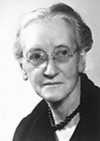 Balch was an American economist and sociologist who taught at Wellesley College until her dismissal in 1918 for opposing US involvement in World War I. She was a co-founder, along with Jane Addams, of the Women’s International League for Peace and Freedom and served as its international secretary from 1919 to 1922. In 1946, she shared the Nobel Peace Prize with longtime YMCA leader John R. Mott. Balch was among the first graduates of what American college in 1889? Discuss
Balch was an American economist and sociologist who taught at Wellesley College until her dismissal in 1918 for opposing US involvement in World War I. She was a co-founder, along with Jane Addams, of the Women’s International League for Peace and Freedom and served as its international secretary from 1919 to 1922. In 1946, she shared the Nobel Peace Prize with longtime YMCA leader John R. Mott. Balch was among the first graduates of what American college in 1889? Discuss
Source: The Free Dictionary
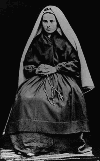 Soubirous was a French peasant girl who claimed to see the Virgin Mary in apparitions at a grotto near Lourdes, her home, in 1858. The authorities, skeptical of her visions, subjected her to severe examinations. After years of scrutiny, she was allowed to enter the convent of Notre-Dame de Nevers, where she remained in seclusion until her death at 35. The grotto at Lourdes is now a pilgrimage site, and its waters are reputed to have healing powers. How many pilgrims visit Lourdes each year?
Soubirous was a French peasant girl who claimed to see the Virgin Mary in apparitions at a grotto near Lourdes, her home, in 1858. The authorities, skeptical of her visions, subjected her to severe examinations. After years of scrutiny, she was allowed to enter the convent of Notre-Dame de Nevers, where she remained in seclusion until her death at 35. The grotto at Lourdes is now a pilgrimage site, and its waters are reputed to have healing powers. How many pilgrims visit Lourdes each year? 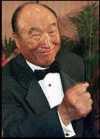 Moon was an engineering student and dock worker before founding the Unification Church—based on his interpretation of Christianity—in South Korea in 1954. After building a multimillion-dollar business empire, he introduced the movement to the United States in the 1960s. Moon, who claims to be the Messiah and presides over ceremonies often called “mass weddings,” is considered a controversial figure, and his movement is often viewed as a cult. In 1982, he was convicted of what crime?
Moon was an engineering student and dock worker before founding the Unification Church—based on his interpretation of Christianity—in South Korea in 1954. After building a multimillion-dollar business empire, he introduced the movement to the United States in the 1960s. Moon, who claims to be the Messiah and presides over ceremonies often called “mass weddings,” is considered a controversial figure, and his movement is often viewed as a cult. In 1982, he was convicted of what crime? 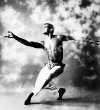 American choreographer and dancer Alvin Ailey, Jr., formed his own company, the American Dance Theater—now called the Alvin Ailey American Dance Theater—in 1958. Multiracial since 1963, Ailey’s dance company has been internationally acclaimed and has brought recognition to many African-American and Asian dancers. His works, influenced by jazz, Afro-Caribbean, and modern dance, explore a wide range of black experience, from gospel music to social inequality. What is his most popular work?
American choreographer and dancer Alvin Ailey, Jr., formed his own company, the American Dance Theater—now called the Alvin Ailey American Dance Theater—in 1958. Multiracial since 1963, Ailey’s dance company has been internationally acclaimed and has brought recognition to many African-American and Asian dancers. His works, influenced by jazz, Afro-Caribbean, and modern dance, explore a wide range of black experience, from gospel music to social inequality. What is his most popular work?  Widely considered the greatest scientist who ever lived, Newton was an English physicist and mathematician. His most famous publication, Principia Mathematica, regarded as the seminal work of modern science, includes his works on the laws of motion, tidal theory, and the theory of universal gravitation. Newton also worked out the fundamentals of calculus, though this work went unpublished for more than 30 years. How might Newton’s study of alchemy have influenced his theory of gravity?
Widely considered the greatest scientist who ever lived, Newton was an English physicist and mathematician. His most famous publication, Principia Mathematica, regarded as the seminal work of modern science, includes his works on the laws of motion, tidal theory, and the theory of universal gravitation. Newton also worked out the fundamentals of calculus, though this work went unpublished for more than 30 years. How might Newton’s study of alchemy have influenced his theory of gravity? Cicero was a statesman, philosopher, unsurpassed master of Latin prose, and one of Rome’s greatest orators. His writings introduced the Romans to Greek philosophy and created a Latin philosophical vocabulary. He was a prolific author, and his letters reveal a wealth of information about Roman life and politics. As an active politician and leader of the senatorial party, he was at times hailed as a hero, but he also made enemies who contributed to his exile and, later, his execution for what?
Cicero was a statesman, philosopher, unsurpassed master of Latin prose, and one of Rome’s greatest orators. His writings introduced the Romans to Greek philosophy and created a Latin philosophical vocabulary. He was a prolific author, and his letters reveal a wealth of information about Roman life and politics. As an active politician and leader of the senatorial party, he was at times hailed as a hero, but he also made enemies who contributed to his exile and, later, his execution for what? 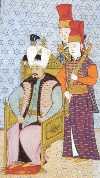 After the deposition and murder of his father, Sultan Ibrahim, 7-year-old Mehmed IV ascended the throne of the Ottoman Empire. Chaos and corruption followed, and though grand vizier Mehmed Köprülü managed to restore order, the empire suffered severe setbacks. In 1683, the Turks besieged Vienna but were repulsed by King John III of Poland, and a Holy League was formed to carry the war into Ottoman territory. Mehmed was deposed after a Turkish defeat by Charles V of Lorraine. Who succeeded him?
After the deposition and murder of his father, Sultan Ibrahim, 7-year-old Mehmed IV ascended the throne of the Ottoman Empire. Chaos and corruption followed, and though grand vizier Mehmed Köprülü managed to restore order, the empire suffered severe setbacks. In 1683, the Turks besieged Vienna but were repulsed by King John III of Poland, and a Holy League was formed to carry the war into Ottoman territory. Mehmed was deposed after a Turkish defeat by Charles V of Lorraine. Who succeeded him?  According to legend, Ross was visited in 1776 by George Washington, Robert Morris, and her husband’s uncle, George Ross, and asked to make a flag for the new nation based on a sketch by Washington. Although Ross made flags during the American Revolution and was the official flag maker for the Pennsylvania Navy, the long-accepted story that she designed and made the first US flag—the Stars and Stripes—is generally discredited. Who first publicized the story of Ross making the flag?
According to legend, Ross was visited in 1776 by George Washington, Robert Morris, and her husband’s uncle, George Ross, and asked to make a flag for the new nation based on a sketch by Washington. Although Ross made flags during the American Revolution and was the official flag maker for the Pennsylvania Navy, the long-accepted story that she designed and made the first US flag—the Stars and Stripes—is generally discredited. Who first publicized the story of Ross making the flag? 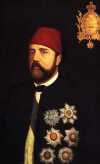 Isma’il Pasha was appointed viceroy of Egypt under the Ottoman Empire and was involved with work on the Suez Canal. He planned but failed to unify the Nile valley by creating a new southern Egyptian province in the Sudan. Educated in Paris and sent on diplomatic missions throughout Europe, he helped to modernize Egypt before being dismissed by the sultan because of fiscal mismanagement. The enormous debt he incurred led to the British occupation of Egypt in 1882. Who captured his son Hassan?
Isma’il Pasha was appointed viceroy of Egypt under the Ottoman Empire and was involved with work on the Suez Canal. He planned but failed to unify the Nile valley by creating a new southern Egyptian province in the Sudan. Educated in Paris and sent on diplomatic missions throughout Europe, he helped to modernize Egypt before being dismissed by the sultan because of fiscal mismanagement. The enormous debt he incurred led to the British occupation of Egypt in 1882. Who captured his son Hassan? 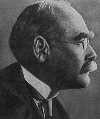 Kipling was raised in England but returned to his birthplace, India, as a 16-year-old journalist. He soon became famous for his stories and poetry, which often feature the heat, strife, and ennui of India and romanticize British imperialism. While in the US in the 1890s, he published The Jungle Book and The Second Jungle Book, stories of the boy Mowgli in the Indian jungle that have become children’s classics. In 1907, he became the first English language writer to win what award?
Kipling was raised in England but returned to his birthplace, India, as a 16-year-old journalist. He soon became famous for his stories and poetry, which often feature the heat, strife, and ennui of India and romanticize British imperialism. While in the US in the 1890s, he published The Jungle Book and The Second Jungle Book, stories of the boy Mowgli in the Indian jungle that have become children’s classics. In 1907, he became the first English language writer to win what award?